Overview
This article highlights the vital ABA services designed to support parents of children with autism. It underscores the importance of tailored interventions, where active caregiver involvement plays a significant role. Continuous assessment is also essential for enhancing communication skills and adaptive behavior. These elements work together to foster improved developmental outcomes for children with autism, paving the way for a brighter future.
As parents, you may often feel overwhelmed by the challenges your child faces. It's crucial to know that you're not alone in this journey. Many families have experienced similar struggles, and the right support can make a world of difference. By engaging actively in your child's development, you can create a nurturing environment that encourages growth.
Consider exploring resources that offer guidance and support tailored to your unique situation. The journey may be challenging, but with the right tools and a compassionate approach, you can help your child thrive. We encourage you to share your experiences and questions, as connecting with others can provide valuable insights and encouragement along the way.
Introduction
Understanding the complexities of Applied Behavior Analysis (ABA) services can feel overwhelming for parents of children with autism. As families explore the many therapeutic options available, the potential benefits of tailored ABA interventions shine brightly, offering a beacon of hope. Yet, a pressing question lingers: how can parents effectively access and utilize these vital services to nurture their child's growth and development? This article explores seven essential ABA services that not only enhance therapeutic outcomes but also empower parents to take an active role in their child's journey toward success.
About ASD Media: Enhancing ABA Therapy Implementation
At ASD Media, we are deeply committed to enhancing our aba service in the implementation of Applied Behavior Analysis (ABA) therapy. Our focus is on providing critical industry insights and effective strategies that truly make a difference. We believe in fostering a supportive community where parents and professionals can share their experiences, learn together, and access essential resources that empower them on their journey.
Research shows that the use of ABA service interventions can significantly improve communication skills and adaptive behavior. This highlights the vital role that community support plays in achieving these positive outcomes. By signing up for our newsletter, individuals can stay informed about the latest developments while gaining unlimited digital access to invaluable resources designed to improve outcomes for youth with autism and ADHD.
As Temple Grandin wisely stated, 'Acceptance is the key to unlocking the potential of every person.' This community-focused approach is crucial; studies reveal that strong support networks greatly enhance the effectiveness of ABA service interventions, leading to better developmental outcomes and an improved quality of life for children.
Furthermore, with 46% of youth continuing treatment for 24 months, ongoing involvement in this community is essential for lasting success. We invite you to join us in creating a nurturing environment where everyone can thrive.
Behavior Analysis Services: Customized Therapy Plans for Children
Behavior analysis services, especially the ABA service, focus on creating individualized treatment plans tailored to meet the unique needs of each young individual. These plans stem from comprehensive evaluations that identify the child's strengths, challenges, and specific goals. By emphasizing individual characteristics, therapists can develop a structured roadmap that supports meaningful progress in areas such as communication, social skills, and daily living activities.
This personalized approach not only increases the relevance and effectiveness of treatment but also promotes significant improvements in adaptive behavior and overall quality of life. For parents, it’s heartening to know that case studies reveal children receiving tailored ABA service experience remarkable gains in navigating everyday situations. This underscores the vital role of ABA service in achieving successful outcomes through customized interventions.
If you’re a parent seeking support, consider exploring these individualized options. They can make a profound difference in your child's journey, fostering growth and confidence every step of the way.
Parent and Caregiver Involvement: Key to Successful ABA Therapy
The active involvement of guardians and caregivers is essential for making the ABA service truly effective. When caregivers engage in the therapeutic process, studies reveal that they significantly enhance the skills learned during sessions at home. This engagement leads to quicker progress and fosters a deeper bond between caregiver and child. Effective caregiver training, particularly through Behavioral Skills Training (BST), encourages collaboration between caregivers and professionals, creating a supportive network.
Organized training sessions empower guardians with practical techniques to implement at home, ensuring consistency and continuity in the learner's environment. This collaborative approach not only nurtures an environment conducive to individual growth but also boosts the overall effectiveness of ABA interventions. Evidence suggests that structured caregiver training can lead to a remarkable 47.7% reduction in challenging behaviors, highlighting its crucial role in achieving positive outcomes.
By equipping caregivers with essential skills, they become invaluable partners in their child’s therapeutic journey, unlocking the full potential of individuals with autism. Moreover, research indicates that involving parents in counseling not only builds a strong support network but also fosters confidence among caregivers. Together, we can create a brighter future for our children.
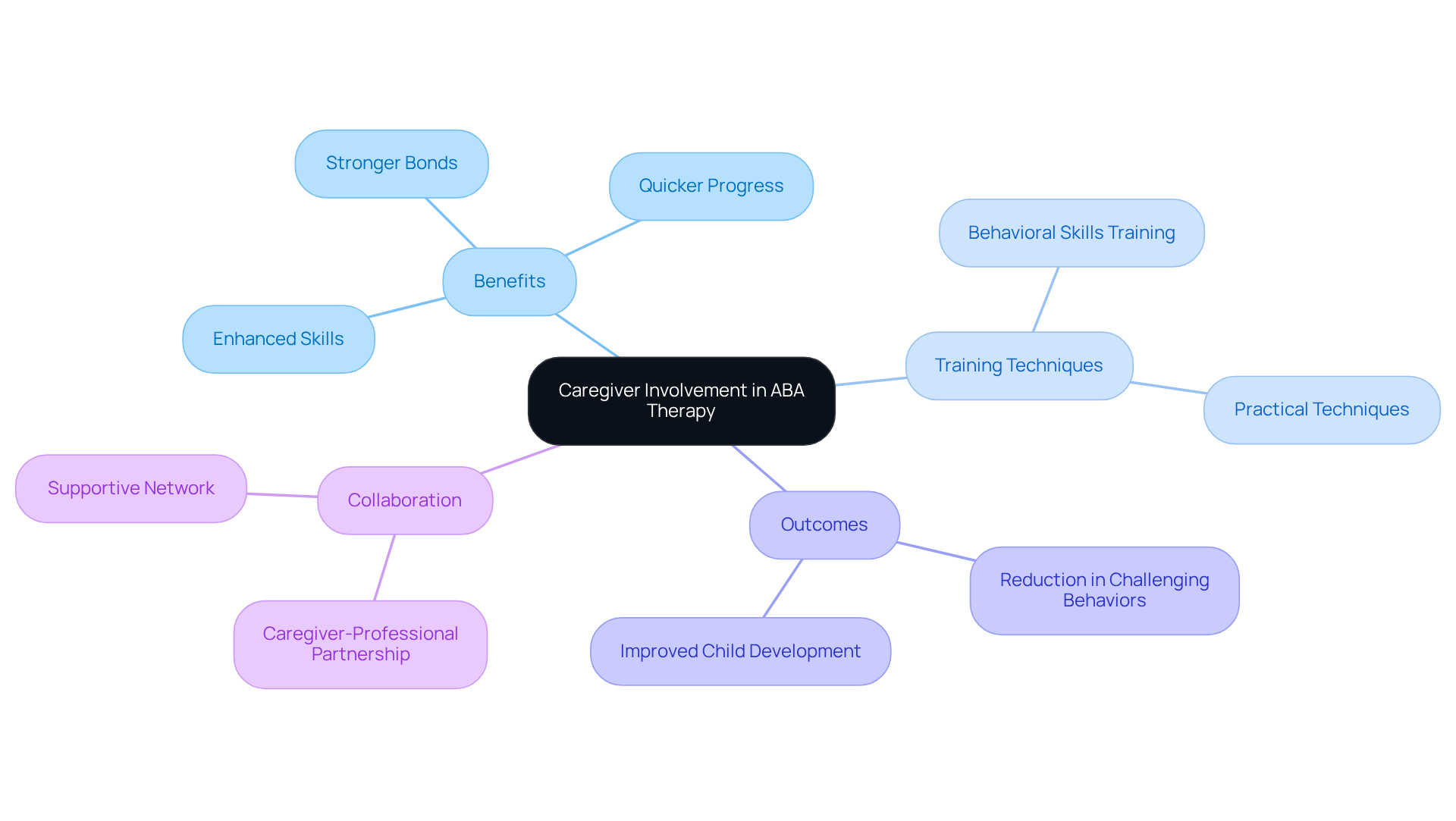
Data Collection and Analysis: Tracking Progress in ABA Therapy
Data gathering and examination are vital for the success of the ABA service, enabling therapists to closely monitor a young person's progress over time. By systematically recording behaviors and responses, therapists can identify trends, assess the effectiveness of interventions, and adjust treatment plans as necessary. Different approaches, such as frequency counts and duration recording, offer valuable insights that guide ongoing treatment, ensuring that each individual's unique needs are effectively addressed.
In 2021, approximately 50% or more of ABA practices utilized digital data collection methods, highlighting the growing reliance on technology to enhance accuracy and efficiency in tracking progress. For example, a SMART goal might state: John will use three-word sentences in 80% of opportunities over the next three months. Consistent data tracking has shown to lead to improved treatment outcomes, as therapists can modify strategies based on real-time evidence.
Moreover, compliance with HIPAA regulations is essential in ABA data collection to protect sensitive personal information. This data-driven approach not only enhances the precision of interventions but also fosters teamwork among therapists, families, and other professionals involved in the care of the young one. Together, we can ensure that every child receives the support they need to thrive.
![]()
Intervention Techniques: Effective Strategies for Behavior Management
The aba service offers a compassionate approach to managing and modifying behaviors, utilizing various techniques that can truly make a difference in the lives of children and their families. Techniques like positive reinforcement, discrete trial training, and modeling are essential tools that help encourage desired behaviors while reducing challenging ones. For instance, positive reinforcement rewards children for displaying appropriate behaviors, leading to a significant decrease in aggression and anxiety levels. Discrete trial training simplifies skills into manageable steps, allowing for focused learning and mastery, which can be particularly beneficial for children on the spectrum.
As parents, your involvement is crucial in this journey. By learning to apply these strategies at home, you can establish a consistent approach that strengthens the skills your child is developing in treatment. Research indicates that children receiving early intervention often experience a remarkable 60% decrease in challenging behaviors within just six months. This highlights the effectiveness of these techniques. Furthermore, children who begin early intervention before age three see an average 17-point increase in IQ scores, underscoring the importance of starting therapy early. By understanding and applying these methods, you can actively participate in your child's behavior management, fostering an environment that supports their growth and development.
Real-life stories illustrate the transformative power of these strategies. Take Ethan, for example—a young boy diagnosed with autism. Through an ABA-based early intervention program that involved caregiver training, he was able to reduce his tantrums by an impressive 70% within a year. This case emphasizes the significance of parental involvement and the effectiveness of tailored behavioral strategies in achieving positive outcomes. Additionally, about 68% of children referred for ABA service remained in the program for one year, highlighting the importance of consistent engagement in treatment. By equipping yourself with knowledge of these intervention techniques, you can greatly enhance your ability to support your child's development effectively.
We encourage you to share your experiences and insights in the comments or through newsletters, as your journey can inspire others. Together, we can create a nurturing community that uplifts and supports one another in this important work.
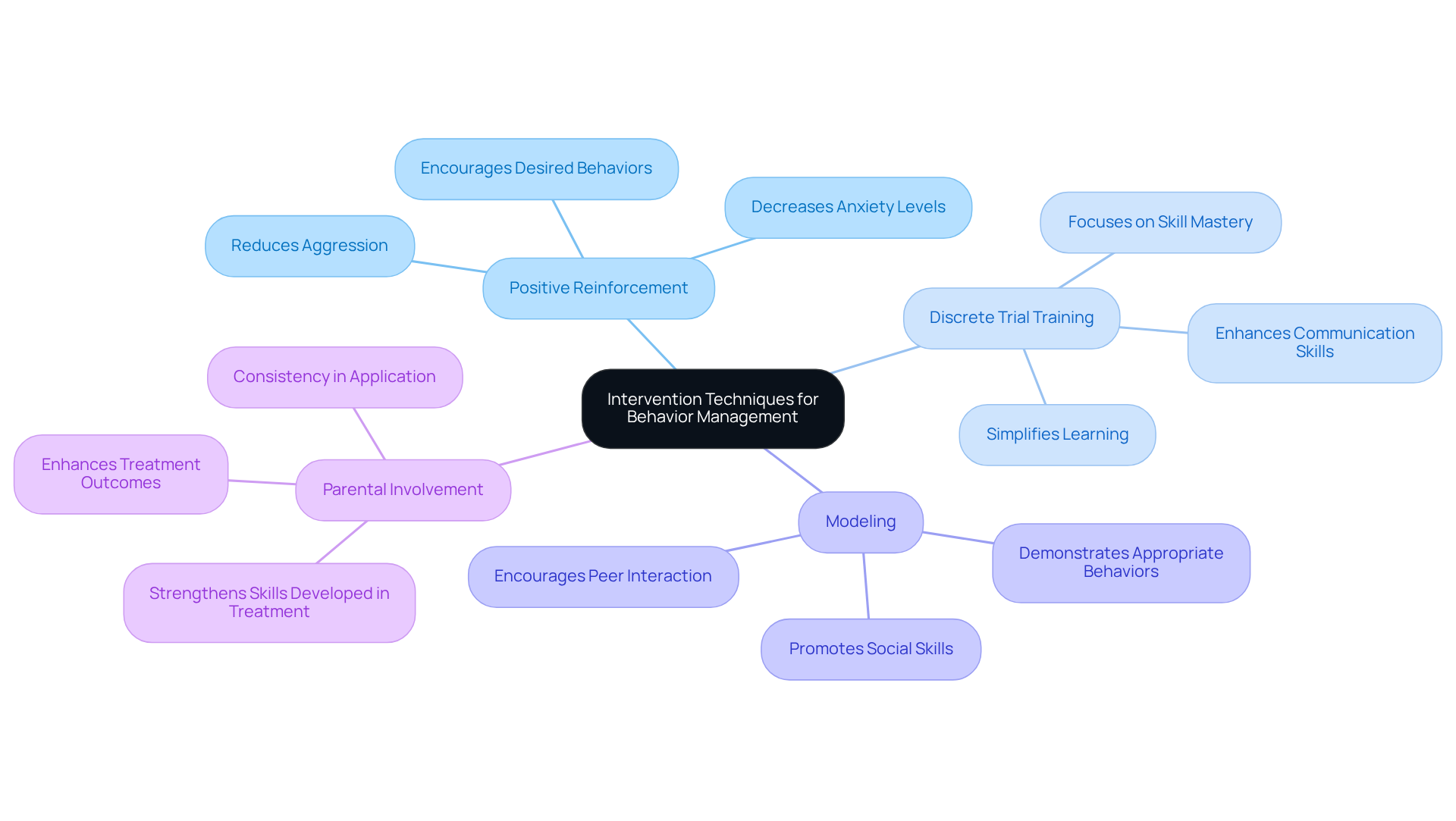
Assessment Services: Establishing Baselines for Effective Therapy
Evaluation services play a crucial role in ABA treatment, helping to establish a foundation for each learner's unique skills and behaviors. These evaluations not only highlight strengths but also identify areas for growth, guiding the development of personalized treatment plans that truly meet the needs of each child. Regular evaluations ensure that the treatment remains relevant and effective, allowing for adjustments that reflect the young person's progress. By understanding where a young person begins, therapists can set achievable goals and track success over time, fostering a supportive environment for growth. It's essential to remember that every step forward is a victory worth celebrating.
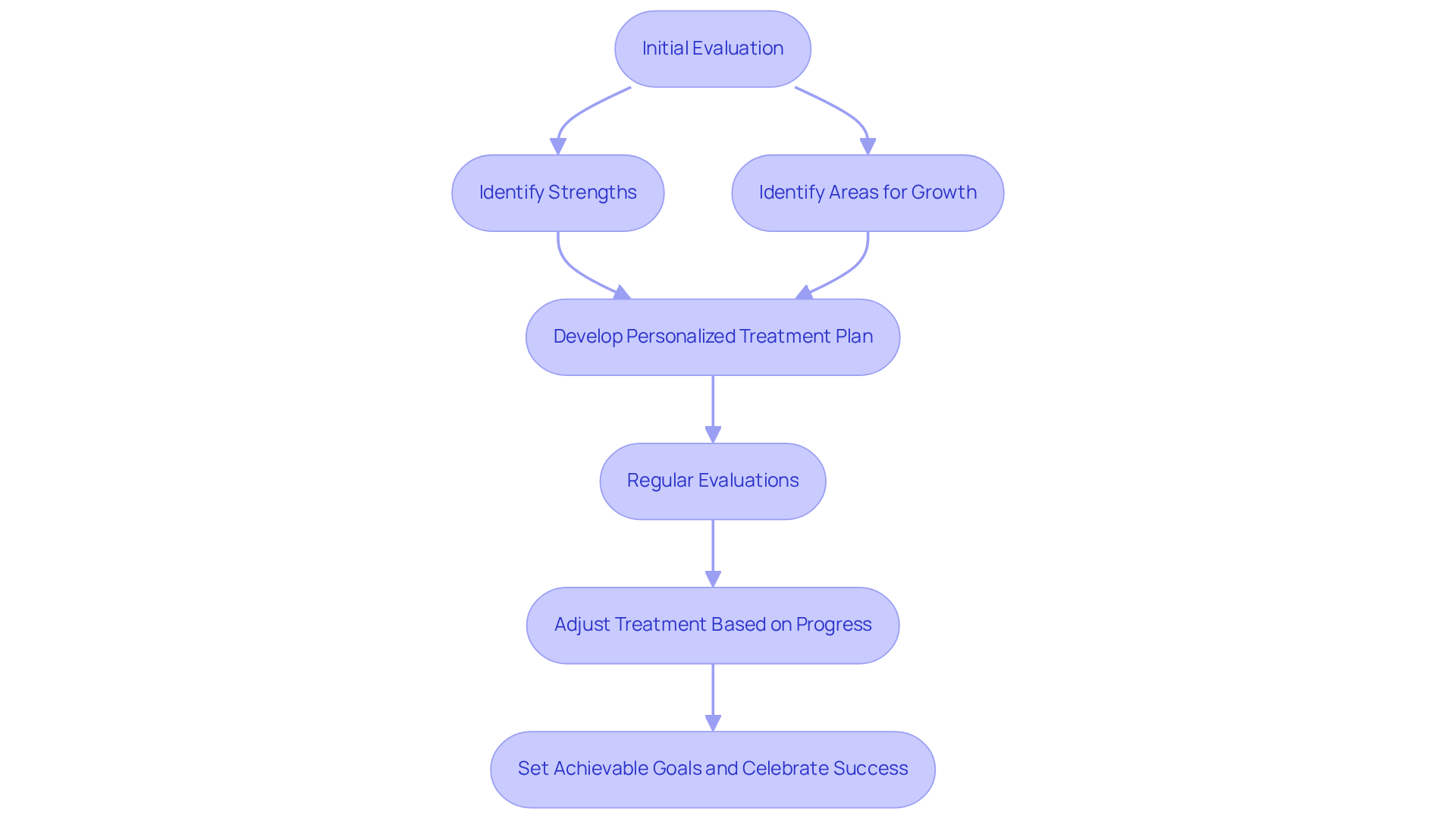
Generalization and Maintenance: Ensuring Lasting Behavioral Improvements
Understanding the importance of generalization and maintenance in ABA practices can truly make a difference in the lives of young people. Generalization is about helping them apply their skills across various environments—be it at home, in school, or within the community. It's a vital step in ensuring that the skills they learn are not just confined to therapy sessions. Maintenance, on the other hand, focuses on the ability to retain and use these skills even after therapy has concluded.
By incorporating strategies that promote both generalization and maintenance, therapists play a crucial role in supporting youth on their journey toward lasting behavioral improvements. These enhancements can significantly uplift their overall quality of life. Imagine the joy of seeing your child confidently navigate different settings, applying what they've learned, and thriving in their daily interactions. This is the goal we strive for together.
If you’re a parent navigating this journey, know that you are not alone. There are resources and strategies available that can help you support your child in this process. Let’s work together to ensure that the skills they acquire lead to meaningful and lasting change.
Eligibility Criteria: Accessing ABA Services for Your Child
Accessing ABA service for youths can feel overwhelming, especially when it comes to understanding the specific eligibility criteria, which often require a formal diagnosis of Autism Spectrum Disorder (ASD). As a parent, it’s important to engage with healthcare providers to clarify the requirements that apply in your state or region. Fortunately, many insurance plans provide coverage for ABA service, making it essential to explore your options thoroughly.
For instance, ABA treatment constitutes 45% of effective long-term interventions for youths with autism. Dr. Ivar Lovaas highlighted the potential of these services by stating, '90% of youngsters make large gains through ABA treatment.' This statistic underscores the positive impact ABA can have on children's lives. Furthermore, research shows that 90% of patients with autism experience behavioral improvements after receiving ABA interventions.
Understanding these eligibility criteria and coverage options is crucial for parents seeking to obtain essential assistance for their children through the ABA service. By doing so, you can ultimately improve their developmental outcomes. Remember, you are not alone in this journey—reach out and gather the information you need to support your child effectively.
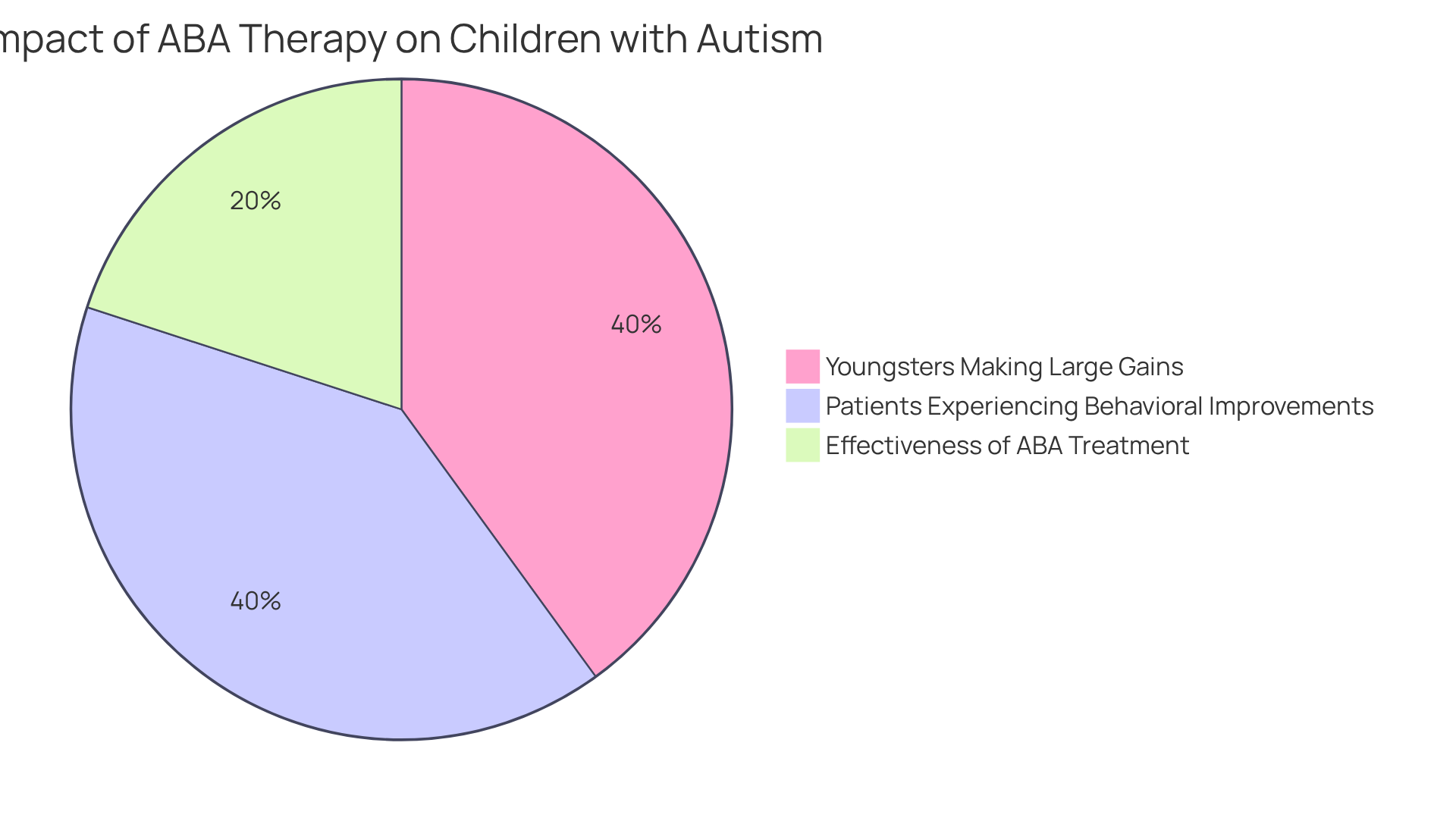
ABA for Autism: Frequently Asked Questions and Answers
As parents, you may often find yourselves grappling with questions about ABA service, particularly regarding its effectiveness, duration, and how it can be tailored to meet your child's unique needs. What is ABA treatment? How does it work? What outcomes can you expect? Addressing these important questions is vital for understanding the role of ABA service in fostering your child's growth and development.
Research shows that early intervention through ABA service methods can lead to significant improvements in communication, behavior, and cognitive abilities. For example, a pivotal study by Dr. Ivar Lovaas in 1987 found that 90% of children who received intensive ABA treatment made remarkable progress, with 47% becoming indistinguishable from their peers. Furthermore, a 2012 study indicated that a minimum of 25 hours of treatment per week is essential for enhancing language and social skills development.
The success of the ABA service is closely tied to its duration, which can vary based on factors such as the severity of autism and specific therapy goals. It's also important to note that only 15% of insured children referred for ABA-based behavioral health treatment received 80% or more of the recommended treatment hours. By providing clear, evidence-based answers to these inquiries, we empower you to make informed decisions about your child's treatment options, ensuring they receive the support necessary for their development and success.
We encourage you to share your experiences and questions with us. Together, we can navigate this journey and find the best paths for your child's growth.
Ongoing Assessment and Planning: Adapting ABA Therapy for Success
Continuous evaluation and flexible planning are vital components of ABA service, enabling therapists to customize interventions to meet each child's unique development and evolving needs. By conducting frequent assessments, we can identify areas that may require additional support, ensuring that the treatment aligns with the child's specific goals. This dynamic approach not only fosters continuous improvement but also enhances the effectiveness of the ABA service.
For instance, when a young person shows progress in communication skills, therapists can adapt their strategies to introduce more complex language tasks, promoting further development. Research indicates that children who receive consistent and adaptable ABA interventions experience significant improvements in cognitive abilities, language skills, and overall adaptive behavior. In fact, studies have shown that ABA intervention boasts an impressive success rate of over 89% in treating children with ASD.
By emphasizing adaptability in treatment strategies and collaborating closely with families, the ABA service can lead to more successful outcomes for children with autism, helping them reach their full potential. Parents play a crucial role in this process by discussing their child's progress with therapists and participating in goal-setting discussions. This collaboration ensures that therapy remains aligned with their child's unique preferences and developmental needs.
We encourage parents to share their experiences and insights, as your involvement is key to creating a supportive environment for your child's growth.
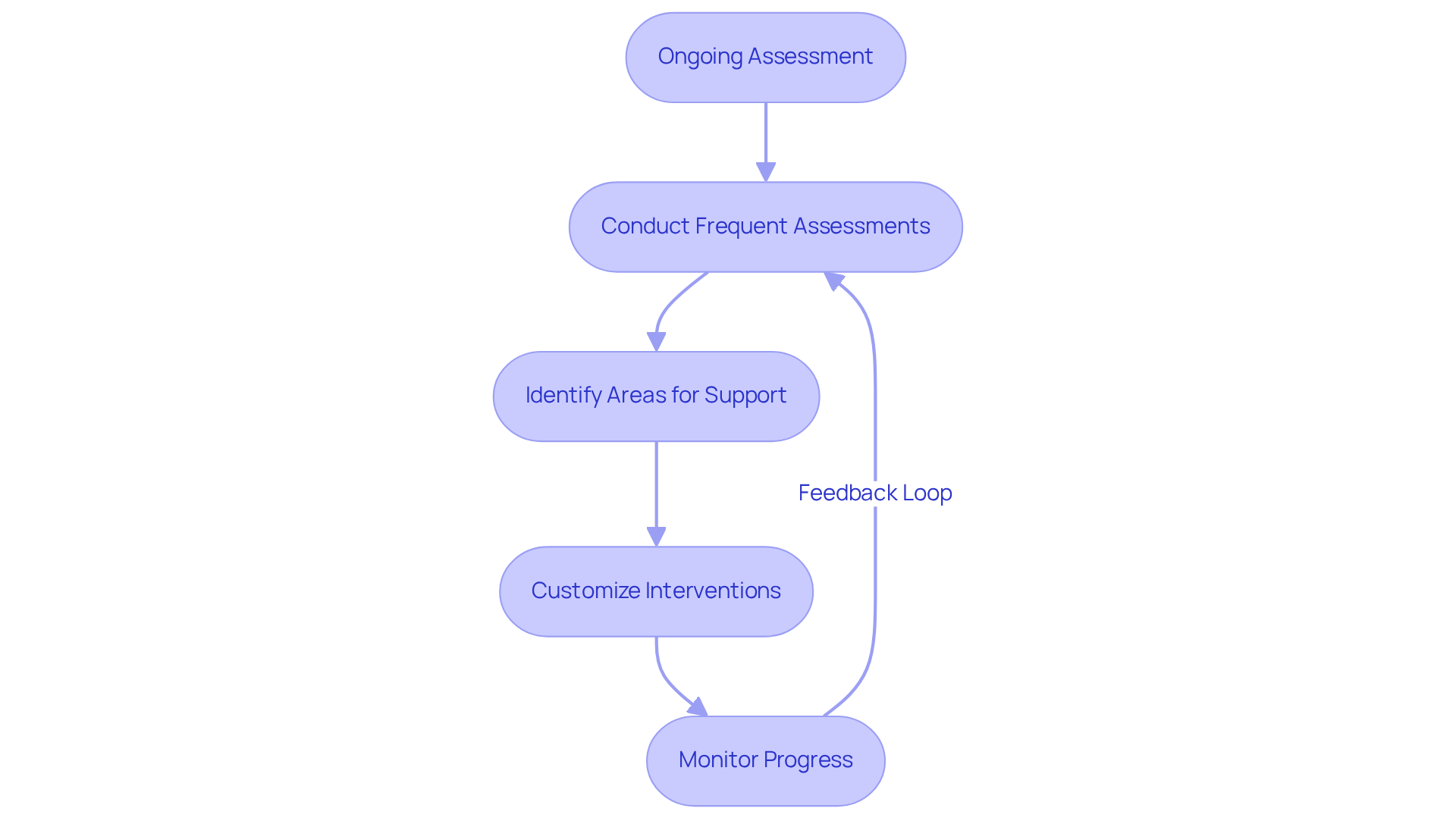
Conclusion
Understanding and accessing Applied Behavior Analysis (ABA) services can be a transformative experience for parents of children with autism. This journey emphasizes the significance of tailored interventions and the vital role parents play in their child's therapeutic path. By engaging with ABA services, families can foster meaningful growth and development, ultimately enhancing their child's quality of life.
Key insights discussed include:
- The importance of individualized therapy plans
- Active parental involvement
- The necessity of ongoing assessments to adapt strategies for optimal outcomes
Effective data collection and analysis are crucial for tracking progress, ensuring that interventions remain relevant and impactful. Moreover, the use of proven intervention techniques can significantly improve behavior management, enabling children to thrive in various settings.
Ultimately, embracing these ABA services empowers parents and creates a supportive environment for children with autism. By actively participating in the therapeutic process and utilizing available resources, families can help their children achieve lasting behavioral improvements and navigate their unique journeys with confidence. Engaging with the community and sharing experiences can further enhance this journey, promoting a collaborative approach that uplifts and inspires all involved. Together, we can make a difference in the lives of our children.
Frequently Asked Questions
What is the mission of ASD Media regarding ABA therapy?
ASD Media is committed to enhancing the implementation of Applied Behavior Analysis (ABA) therapy by providing critical industry insights, effective strategies, and fostering a supportive community for parents and professionals.
How does community support impact ABA therapy outcomes?
Community support plays a vital role in achieving positive outcomes in ABA therapy, as studies show that strong support networks enhance the effectiveness of interventions, leading to better developmental outcomes and improved quality of life for children.
What resources does ASD Media offer to individuals interested in ABA therapy?
ASD Media offers a newsletter that keeps individuals informed about the latest developments and provides unlimited digital access to essential resources aimed at improving outcomes for youth with autism and ADHD.
How does the ABA service create customized therapy plans?
ABA services create individualized treatment plans based on comprehensive evaluations that identify each child's strengths, challenges, and specific goals, allowing therapists to develop a structured roadmap for meaningful progress.
What are the benefits of personalized ABA therapy for children?
Personalized ABA therapy significantly improves adaptive behavior and overall quality of life, with case studies showing that children receiving tailored interventions experience remarkable gains in navigating everyday situations.
Why is parent and caregiver involvement important in ABA therapy?
The active involvement of parents and caregivers is essential as it enhances the skills learned during therapy sessions, leads to quicker progress, and fosters a deeper bond between the caregiver and child.
What is Behavioral Skills Training (BST) and its role in caregiver involvement?
Behavioral Skills Training (BST) is an approach that equips caregivers with practical techniques to implement at home, ensuring consistency in the child's learning environment and boosting the overall effectiveness of ABA interventions.
What impact does structured caregiver training have on challenging behaviors?
Structured caregiver training can lead to a remarkable 47.7% reduction in challenging behaviors, highlighting its crucial role in achieving positive outcomes in ABA therapy.
How does involving parents in counseling benefit caregivers and children?
Involving parents in counseling builds a strong support network and fosters confidence among caregivers, which contributes to creating a brighter future for children with autism.




